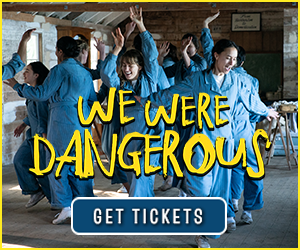THE STORY – An aspiring clown grappling with her gender identity combats a fascistic caped crusader.
THE CAST – Vera Drew, Lynn Downey, Christian Calloway, Griffin Kramer, Kane Distler, Nathan Faustyn & Phil Braun
THE TEAM – Vera Drew (Director/Writer) & Bri LeRose (Writer)
THE RUNNING TIME – 92 Minutes
The conversation around comic book movies and their ultimate value in society is often a tiring one. The discourse that comes about often lacks an engaging nuance and just adds more noise to the already cluttered and disorganized landscape of film analysis. Meaningful topics can be mined from such an examination, but they are outnumbered by trivial talking points and pedestrian arguments. It’s what makes the opportunity for a bold and vibrant commentary to be recognized. “The People’s Joker” is not what one would typically consider when entering this conversation, and what the film has to say on the nature of this particular subgenre doesn’t always find the most compelling execution. However, underneath the garish surface is an endearing personal tale that is far more engrossing.
“The People’s Joker” is set in the world of Batman. However, it may be more appropriate to say “the worlds” of Batman, as it parodies several incarnations and settings in which the famous character has existed. The main journey here is a young person (Vera Drew) trying to escape their small-town existence in Smallville and indulge in their dreams of working in professional comedy. After fleeing to Gotham City, they find an absurd barrier to entry, including a fully animated Lorne Michaels dictating who will be chosen for his variety show in a town that has outlawed all other forms of unauthorized comedic displays. Dissatisfied with the process, they decide to team up with The Penguin (Nathan Faustyn) to run an underground comedy circuit. Through this, their personal evolution of transness emerges. As their supervillain origin story is showcased, so too does their personal identity become even stronger.
Admittedly, it’s hard to get around the overall aesthetics on display and how that ultimately hinders a great deal of connecting to this piece. Obviously, the production value is far more modest than the films being satirized would generally be afforded. So much of the film extensively uses green screen and cheap models to occupy the more open environment. There is some charm to this, such as indulging in a scrappy tone and being fully committed to this design despite lacking a gargantuan budget. At the same time, the cheap visuals can be equally distracting and appear more like a glorified YouTube production than a professional feature film. This is not to denigrate the work itself, but this often lessens the overall impact. The filmmaking has a great deal of passion. Still, when even the simplest of interiors portray a heavy artifice, it’s difficult to become convinced one is watching a professional production and to become fully engaged.
Even more underwhelming is that the direct parody is not particularly interesting and struggles to be genuinely funny. There are some nice nods that put a smile on one’s face, particularly a send-up of the infamous stairwell dance from “Joker” set to a spoofed cover of Prince’s “Partyman.” However, most of the barbs are rather lackluster. This sheen of the DC universe is meant to mainly be the foundation for a personal story about coming to terms with one’s transness. That is where Drew, also the film’s writer-director, has much more success in conveying an engrossing perspective. There’s a deeply resonant narrative presented, one that finds the shades of nuance with such a complicated expedition of self-discovery. There are typical exploits of fractured parental relationships, but there are also more complex notes, such as when the main character enters a romantic relationship, embodied by transgender actor Jason Todd. What’s presented is a genuine shade of complexity that is quite valued, adding a great deal of character dimension to material that otherwise plays on the surface. There is potential for this story to convey a more intriguing analysis, leaving a greater impression than the jokes, which more directly reference the intellectual property.
This is the true frustration at the heart of “The People’s Joker.” Drew clearly has an affection for both her own personal venture as well as for the pop culture touchstones regarding these characters. One wishes that perhaps the balance was tipped more in the former, existing in a more realistic space where the Batman setting is more grounded in interacting with these more intimate themes. Her performance has a sense of that, as she’s both droll and sensitive enough to create effective pathos. It’s a portrayal much more captivating than the broad caricature that Faustyn and several others attempt. In fairness, nobody embodies a convincing persona, but only one manages to craft a natural emotional connection. The tone is meant to be hyperbolic, so the characterization follows suit. It’s just not that enthralling to witness most of these actors.
One cannot deny that much of what’s featured in “The People’s Joker” comes across as amateurish. The production value is made to appear intentionally rough, which hinders the overall quality of the filmmaking. Despite those shortcomings, there is a fascinating tale at the core. One is genuinely drawn into the evolution of this character, specifically because it contains real-world stakes and ambitions. The attempts to graph this thesis onto the broader satire result in an ill-fitting drape, but it is still oddly stimulating. It’s easy to envision a more rewarding experience while being simultaneously drawn in. It’s a noble effort that is highly flawed but amusing to its core.






